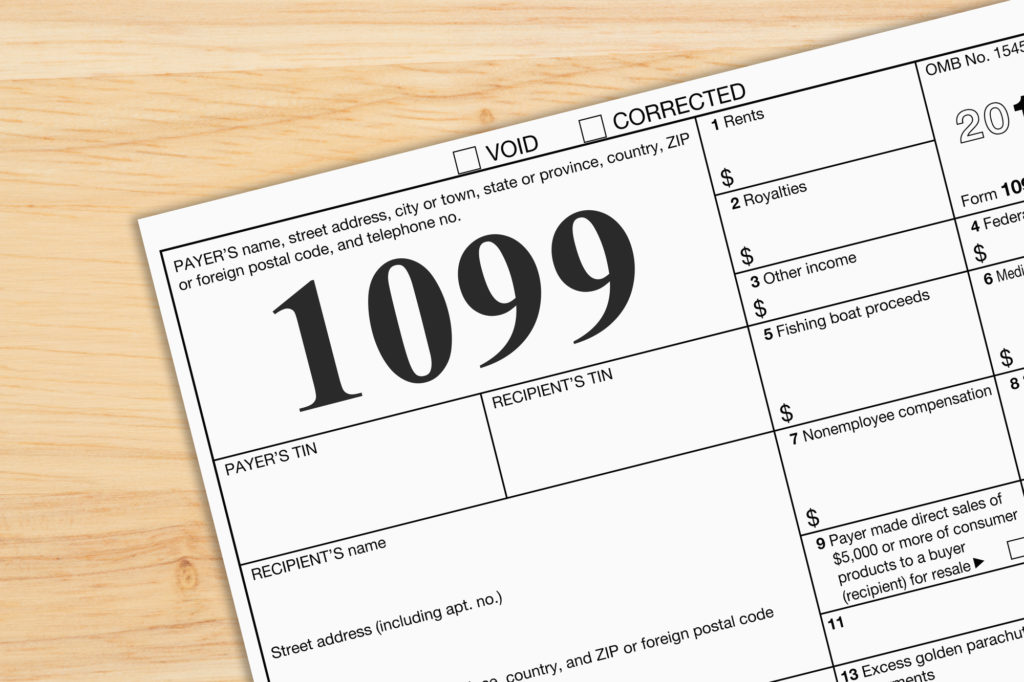How to Track 1099 Expenses as an Independent Contractor?
If you are a self employed independent contractor looking to track 1099 expenses, this article is here to help. Here is everything you need to know about tracking expenses and receipts as a 1099 contractor.

Having a business of your own and being self employed comes bearing a surge of independence. With the liberty to no longer be answerable to be held accountable for every decision and choice, an independent contractor also faces their fair share of added responsibilities.
With an added load of responsibilities, there’s also divorce from employee perks and benefits. Furthermore, self employment also implies that you’ll be yearning to get the most significant tax break possible. A detailed accounting of business expense and well-kept tax documents can help smooth the journey to calculate the estimated taxes during the tax time.
What’s in this article?
- Know what expenses are qualified as 1099 expenses by the IRS
- Keep track of your 1099 digital receipts
- Scan your paper receipts and digitize them
- Organize your 1099 receipts
- Use a 1099 spreadsheet template (Excel or google sheets)
- Standard 1099 deduction expenses
- Itemized 1099 deduction expenses
- 1099 part time work expenses
- File your quarterly estimated tax
- How to make more money from 1099 deduction expenses as an independent contractor
- Summary
Know what expenses are qualified as 1099 expenses by the IRS
Before you set out to track 1099 expenses, it is essential to know what to track in a self employment business. Broadly differentiating, expenses are of two categories, which is personal expense and business cost.
The IRS website defines a business expense as anything that is “ordinary” and “necessary” to the business.
For instance, if you have to travel to another city for a business conference, your convenience charges, food and beverage consumption, and the cost of your lodging will qualify as the business cost. However, according to IRS, if you indulge in shopping or a city tour, that will be a personal expense.
Keep track of your 1099 digital receipts
Estimated taxes can be calculated by meticulously recording all the costs and business expenses and filing receipts accordingly. The advancement of technology and the shift towards digital money motivate several vendors to dispatch receipts and invoices electronically.
Therefore, an independent contractor must keep track of their business expense information and receipts in a dedicated folder on their electronic devices for their perusal.

A few small business owners also suggest maintaining a physical folder to file and record paper receipts for calculating employment tax.
While simultaneously storing and updating tax files with digital receipts might seem cumbersome to a few, it is advisable to save receipts in a safe and dedicated spot or folder at the very least.
In rare but a few cases, self employment avenues may run into a bad debt or go through an IRS audit. Tips like holding onto receipt files and tax returns for a minimum of seven years to combat such situations are advisable.
Scan your paper receipts and digitize them
Managing, filing and recording business expense receipts and data is quite a tedious task. It tends to get more complicated when you have to deal with paper receipts. While it may be simpler for a few to manage paper receipts, there is a fair chance of losing them or misplacing them. Therefore, a digital copy is helpful and reliable for safety and calculating taxes.
To avoid the risk of misplacing business receipts, you may make digital copies by scanning the physical receipts and storing them in the same folder as the others.
Another suggestion to avoid losing physical receipts until they are digitized is to have a dedicated monthly folder in your frequently used vehicle. You can store your receipts in such a folder and digitize them at the end of every month for safekeeping.
Organize your 1099 receipts
Relying solely on your bank account or credit card statements to meet IRS requirements is not recommended or reliable. Even small businesses must classify and organize their form 1099 to avoid any tax troubles. Here are a few methods to keep track of employment tax and organizing your form 1099:
1. Label receipts
While it may look like a small business or an independent contractor can only incur so many expenses, they may multiply without enough anticipation. Therefore, it is essential to note your business receipts as and when they occur to avoid any miscalculation or neglect.
Labelling a particular receipt also helps in categorizing them in account books later. For instance, you might want to write “dinner” at the back of a receipt for a business dinner shared with an investor.
2. Digital receipts
Receipt scanners and mobile phone cameras are inarguably a boon for a small business or an independent contractor looking for organizing 1099 receipts. Digitizing business expense receipts and payments protects you against the risk of losing any receipt or the drying out of the ink. A digital receipt is also easier to organize and quicker to locate.
3. Classification of receipts
Organizing business receipts by category will make your tax calculation a breeze and allow you to refer to a particular transaction or payment without having to go through never-ending files. You can classify receipts based on the following categories:
– Advertising and promotion
– F&B and Entertainment
– Travel expenses
– Company rental bill
– Utilities
– Communication or phone bill
– Supplies
– Legal fees
– Insurance fees
Use a 1099 spreadsheet template (Excel or google sheets)
Perhaps the best way to track your income and business expense as an independent contractor is through spreadsheets. Furthermore, it is beneficial while filling out 1099-misc forms.
Open either Excel or Google Sheets to begin the expense tracking process.
Create four columns with labels like item, cost, date, and receipt. You may even prefer making notes, inserting links or adding location addresses in a separate column for convenient referencing.
Excel also offers a 1099 excel template to help new independent contractors or small business owners moving to digital expense tracking. A software or an online app like QuickBooks, Intuit, or Zoho automatically collects and records data without employer or employees’ intervention.
Standard 1099 deduction expenses
A standard deduction is a tax write off offered to every American for being a resident in the country. This blanket provides income tax exemption for single people who earn less than $12,000 as of 2018.
Tax Filing Status
2019 Standard Deduction
Single
$12,200
Married filing jointly
$24,400
Head of household
$18,350
Itemized 1099 deduction expenses
The standard deduction trades off with itemized personal deductions in self employment businesses. If it is less than $12,000, then an independent contractor can easily claim their standard deduction.
Tax deductions are classified as either personal or business to simplify the understanding of itemized deductions’ process.
Personal deductions are:
– Donations
– Medical expenses
– Rent or property taxes
– Interest
However, 1099 deductions are:
– Car expenses
– Communication
– Supplies
– Meals and entertainment
Tax deductions related to 1099 work are on top of the standard deduction in self-employed contractors.
1099 part-time work expenses
It is always helpful to track 1099 work expenses even if you are working part-time. For example, you rent an extra room in your house on Airbnb and earn an extra $4,000 from your total income of $40,000. After calculating your freelances taxes owed, there’ll still be a need to pay the standard 30% tax rate of $4,000 on the 1099-misc income form.
Tracking business expenses related to 1099 work will thus, help you save a significant amount of money.
File your quarterly estimated tax
Paying your quarterly estimated tax is the last component of 1099-misc expenses.
While paying the entire amount once and for all during the tax season may be easy for a few small businesses and independent contractors, IRS also provides for those who wish to spread their tax payment. An employer can conveniently spread the tax payments over the year through estimated quarterly payments.
Estimated tax payment can be prepared using a quarterly tax calculator on the figures from last year for further convenience.
At the end of the year, this estimation may turn accurate, or you have to pay a little more tax based on your earnings. However, there is also a fair chance of owning an income tax refund, which is again based on your earnings.
The greatest advantage of using a quarterly estimated tax method is that a major chunk of your tax is regularly paid, which reduces the burden during the tax season.
How to make more money from 1099 deduction expenses as an independent contractor
There are a few things that can be done to write off taxes and make more money:
1. Home office
An independent contractor or a self employed individual has the liberty to work from their choice of space, which can also be their home. A home could thus be their workstation, storage space for inventory, or meeting room. You can write off $5 per square foot up with IRS calculation.
2. Educational expenses
Educational expenses are often tax-deductible for self employed freelancers. These include virtual conferences, webinars, or purchasing business-related books and subscriptions to enhance education or grow your business.
3. Car expenses
A car or a vehicle may be used to deliver products, procurement of raw materials or any other business task. Car expenses and mileage are, therefore, one of the most significant tax write-offs for independent contractors.
The IRS standard mileage rate is about 57 cents per mile for tax deduction purposes. Parking fee and toll taxes are also deductible expenses.
4. Business travel
An independent contract might also require travel overseas or to different cities to meet clients or attend industry conferences. During a business trip, your meals, airfare or conveyance charges, and lodgings are susceptible to 50% write-offs as business expenses.
5. Business insurance
There may be unexpected expenses or accidents while running a business or even as an independent contractor. Business insurance protects you from such losses, which is also a part of 1099 tax deductions.
Summary
Being an independent contractor or self-employed individual comes bearing a lot of freedom of work, job role and general flexibility. Still, unlike a full-time employee, you also have to deduct your taxes under 1099 work expenses. While it may seem a daunting task, it is simpler to follow with a structured and streamlined approach of tracking expenses and gaining awareness in writing off estimated taxes.
Don’t forget to share









